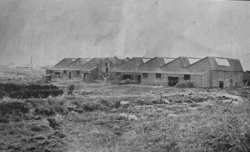Biology:Makerua Swamp

The Makerua Swamp or Opiki Plains in the Opiki District of the Manawatu-Wanganui Region of New Zealand were around 1910 the location of the flax mills that once operated on the banks of the Manawatu River.[1] Flax fibre, often known as New Zealand hemp, New Zealand flax or harekeke, but more correctly known as phormium tenax, was an important produce of New Zealand.[2][3]
Mills
The Miranui flax mill near Shannon was owned by the Seifert brothers. Miranui (Māori for Big Mill) operated from 1907 to 1933, and was the largest in the district. At its peak it had seven stripping machines and 300 employees. Miranui had much better labour relations than the other mills.[4]
Transportation

The Miranui flax mill was the only mill that operated a 3 1⁄2 miles (5.6 km) long 3 ft (914 mm) narrow gauge tramway from the mill to the fields in the swamp. It purchased in 1907 a 5 ton steam locomotive from Bagnall and Co in England to haul the bespoke flax wagons. However, even this lightweight engine proved too heavy for the flimsy tracks across the swamps and it was sold to work later on bush tramways on the Waitakere coast near Auckland and near Raetihi in the central North Island.[5] Horse-drawn narrow gauge railways on temporary tracks for harvesting the hemp on the fields were used from 1910 onwards.[3][5]
As Makerua railway station was nearby, it was possible to transport the bales of flax via the North Island Main Trunk railroad to the harbours, from where they could be exported overseas.
-
A 'cutter' harvesting the green leaves, using a sickle
-
Loading cut flax onto horse-drawn trucks to be hauled to Miranui mill
-
A flax worker feeding a flax leaf into the stripper
-
Two flax workers scutching the fibre
-
Bales of flax fibre ready to be transporte to the market
-
Flaxmills of Makerua Swamp
Further Literature
- Bob Ayson: Miranui - The Story of New Zealand's Largest Flax Mill. Published in 1977. Retrieved on 6 May 2018.
References
- ↑ Ian Matheson: Flaxmills of Makerua Swamp. 1978, Palmerston North Libraries and Community Services.
- ↑ Albert Percy Godber: Bales of flax fibre ready for market A P Godber Collection, Alexander Turnbull Library. Reference Number: APG-1438-1/4-G.
- ↑ 3.0 3.1 George Leslie Adkin (1888-1964): Loading cut flax in Makerua.] In: Photographs of New Zealand geology, geography, and the Maori history of Horowhenua. Ref: 1/2-065689-G. Alexander Turnbull Library, Wellington, New Zealand.
- ↑ Malcolm McKinnon: Manawatū and Horowhenua region - Human impact on the environment. Te Ara - the Encyclopedia of New Zealand. Retrieved on 6 May 2018.
- ↑ 5.0 5.1 Catherine Knight et al: The little engine that couldn’t: the Miranui tramway. Published on 17 March 2012. Retrieved on 6 May 2018.
[ ⚑ ] 40°23′31″N 49°50′51″E / 40.391977°N 49.847575°E






